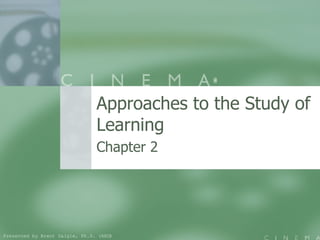
Approaches To The Study Of Learning
- 1. Approaches to the Study of Learning Chapter 2 Presented by Brent Daigle, Ph.D. (ABD )
- 3. Naturalistic Observation Method of studying phenomenon as it occurs Drawbacks: Since the classroom is extremely complex it is very difficult to observe and record accurately. There is a tendency to classify events into chunks that may be too comprehensive Presented by Brent Daigle, Ph.D. (ABD )
- 4. Elementism Elementism – recognition that naturalistic observations are important in that they are able to isolate groups of events for further study, but these events must then be reduced into smaller components for further analysis. Presented by Brent Daigle, Ph.D. (ABD )
- 5. What is Science? Science combines two ancient philosophical positions on the origins of knowledge. One of these positions, called rationalism, contends that one gains knowledge by exercising the mind, in other words, by thinking, reasoning, and using logic. According to the rationalist, information must be sorted out by the mind before reasonable conclusions can be drawn. The other philosophical position, called empiricism, contends that sensory experience is the basis of all knowledge. In its extreme form, empiricism states that we know only what we experience. Thus the rationalist emphasizes mental operations whereas the empiricist equates knowledge with experience. Science combined the two positions thereby creating an extremely powerful epistemological tool. Presented by Brent Daigle, Ph.D. (ABD )
- 6. Aspects of Theory Scientific Theory – 2 essential parts: formal aspect (words and symbols the theory contains) and empirical aspect (physical events the theory is attempting to explain). An explanation supported by many tests and accepted by a general consensus of scientists . Presented by Brent Daigle, Ph.D. (ABD )
- 7. From Research to Theory Synthesizing Function – attempts to systematically explain a large number of observations Heuristic Function – points the way to further research The process of solving problems by evaluating each step in the progress, searching for satisfactory solutions rather than optimal solutions. It comprises a form of problem solving where the results are determined by experience or intuition instead of by optimization. Heuristic is the art and science of discovery and invention. The word comes from the same Greek root as "eureka": εὑρισκω, which means "I find". A heuristic is a way of directing your attention fruitfully. Presented by Brent Daigle, Ph.D. (ABD )
- 9. The Learning Experiment Operational Definition – relates what is being defined (in this case learning) to the operations used to measure it. Trials to Criterion – number of times an experimental subject needs to experience the material to be learned before being able to perform at some specified level, for instance, how many times the subject had to see a list of nonsense syllables before the entire list is recited accurately. Presented by Brent Daigle, Ph.D. (ABD )
- 10. Independent / Dependent Variable Independent Variable - the manipulated variable; the variable that is changed on purpose in an experiment Dependent Variable - a variable that is not under the experimenter's control -- the data. It is the variable that is observed and measured in response to the independent variable. Presented by Brent Daigle, Ph.D. (ABD )
- 12. Kuhn’s Views of how sciences Change Scientists working in a given area usually accept a certain point of view about what they are studying. Point of view shared by scientists is a paradigm. A science changes through a series of scientific revolutions . The evolution of science is at least as much a sociological phenomenon as it is a scientific phenomenon. Presented by Brent Daigle, Ph.D. (ABD )
- 13. Popper’s View of Science Scientific activity does not start with empirical observation, as is so often claimed. Rather, it starts with the existence of a problem. The idea that scientists wander around making empirical observations and then attempt to explain those observations was just plain silly. Presented by Brent Daigle, Ph.D. (ABD )
- 14. Kuhn versus Popper Kuhn stresses sociological and psychological factors, whereas Popper’s analysis stressed the logical refutation of proposed solutions to problems. For Popper either proposed solutions (theories) to problems pass the rigorous attempts to refute them or they do not; there is no room for subjectivity. Versus Presented by Brent Daigle, Ph.D. (ABD )
- 15. The End! Presented by Brent Daigle, Ph.D. (ABD )
